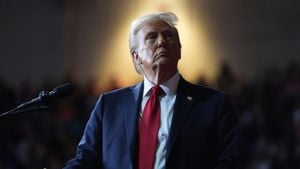Potentially unsettling news is brewing on the global stage, as reports indicate Yemeni fighters, affiliated with the Islamist Houthi movement, might be joining forces with Russia in its protracted war against Ukraine. According to The Financial Times, this development could mark yet another troubling escalation amid the existing turmoil surrounding the conflict.
Sources reveal the Houthis, known for their significant role within Yemen, are reportedly identifying and recruiting individuals willing to take part in the Russian military's endeavors. It seems Yemen's militant group has taken advantage of the prevailing chaos, with reports stating they have already dispatched hundreds of their fighters to Russia via what’s being described as a "shadowy trafficking operation." This alarming trend raises questions not only about the integrity of recruitment practices but also about the broader geopolitical ramifications.
Many of these individuals were lured with false promises of salary and even Russian citizenship upon arrival. Instead, they encountered stark realities—being coerced directly to join the ranks of the Russian army and dispatched to the battlefields of Ukraine. This harrowing detail highlights the desperation felt by some Yemeni men, who view this as their only avenue for security and opportunity.
An alarming additional note from The Financial Times pointed out the recruitment efforts appear to be linked to a firm initiated by a notable Houthi politician. Recruitment contracts indicate these operations have been underway since July 2024, which aligns with the intensifying conflict and complications already arising from the extended war.
The situation is adding fuel to some already fiery concerns within international circles. Prominent concerns have emerged from nations such as Germany and Poland, expressing alarm at the potential escalation of the conflict. The German Foreign Ministry labeled such reports as "extremely worrying," stressing the gravity of the current geopolitical climate and the prospects of what could evolve from this situation.
Polish Prime Minister Donald Tusk voiced similar concerns, implying the risks of entering what many fear could devolve beyond regional conflicts, potentially spiraling toward "global war." The specter of World War III has been raised more than once, particularly as the conflict draws multiple nations and forces ever closer together.
Notably, Ukrainian military leaders have added to this discourse. Valerii Zaluzhnyi, Ukraine's former army chief and now ambassador to the U.K., has directly contended, “World War III has already begun,” as various global actors find themselves embroiled in this complex war. The ramifications this has on troop movements and strategies highlight just how intertwined these conflicts have become.
There have been harrowing reports on the casualty front as well—Russia has encountered staggering losses, counted near 700,000 soldiers lost throughout the war so far. Such numbers inevitably lead countries like North Korea to step in; Kim Jong Un’s regime has supplemented Russian forces with around 12,000 soldiers dispatched to combat zones, indicating the country’s heavy reliance on foreign fighters to keep its military afloat; one could call it desperation on the national stage.
The narrative around Yemeni fighters being funneled to the Ukrainian front has also made waves at significant diplomatic gatherings, such as the recent G7 foreign ministers meeting held in Italy. Germany's Foreign Minister Annalena Baerbock made this explicit, emphasizing if these actions are verified, it exemplifies the lengths to which President Putin is willing to go, launching forces from varied regions with minimal regard to any conventional warfare rules.
Roderich Kiesewetter, a German lawmaker from the Christian Democratic Union (CDU), posited these developments are not entirely surprising. He echoed sentiments acknowledging Russia’s extended logistical and personnel challenges, stating, “It now has to pay Russian soldiers very high sums to be mobilized and is offering them debt relief.” His insights underline the widening net of recruitment methods and how conflict can lead to less conventional alliances.
Interestingly, these growing ties raise additional alarms. Not only does this tie Russia to two militant groups—Hamas and the Houthis—but it also indicates Iran’s role as more than just a supporter, as it facilitates the connection through its wide-ranging backing. Kiesewetter cautioned, “There are indications these are not Houthi terrorists, but Yemenis lured to Russia with false promises,” drawing attention to the ethical dilemmas surrounding forced recruitment and the dire situation many find themselves amid war.
Looking closer to home, the Ukraine war has developed beyond mere military strategy; it has become pivotal to discussions surrounding upcoming German elections. With Chancellor Olaf Scholz at the helm, the topic of Ukraine's struggle will inevitably dominate public discourse as national sentiment fluctuates surrounding troop deployments and arms supplies. Recently, Scholz has painted himself as a "chancellor of peace," demonstrating hesitance concerning supplying missiles to Ukraine, which could strike deeply within Russian territory.
One recent survey indicated approximately 61% of individuals polled were against sending Germany’s advanced Taurus missile system to aid Ukraine. This brewing sentiment reflects the balancing act many politicians face—not just backing international allies but also appeasing domestic concerns over escalation.
The ramifications extend beyond Germany, with the U.S. role under scrutiny as former President Donald Trump prepares to take the reins once again. With differing foreign policy tactics expected, analysts ponder what course the U.S. might take concerning Germany’s engagement and sanctions on Russia.
With the winds of war blowing ominously, the recruitment of Yemeni fighters reflects not just on the ground realities but how nations are scrambling to fill the voids caused by losses. The approach Putin seems to be adopting, working closely with groups like the Houthis, raises not only ethical questions but also serious concerns about how international engagements are structured as the conflict continues.
Moving forward, it's clear this recruiting tactic could spark significant reactions from governments worldwide, as the reality on the ground becomes increasingly convoluted. With military strategies intertwining and new alliances forming seemingly overnight, the issue feels far from settled, as Yemen's Houthis and other regional players redefine how international conflicts evolve amid chaotic landscapes.



